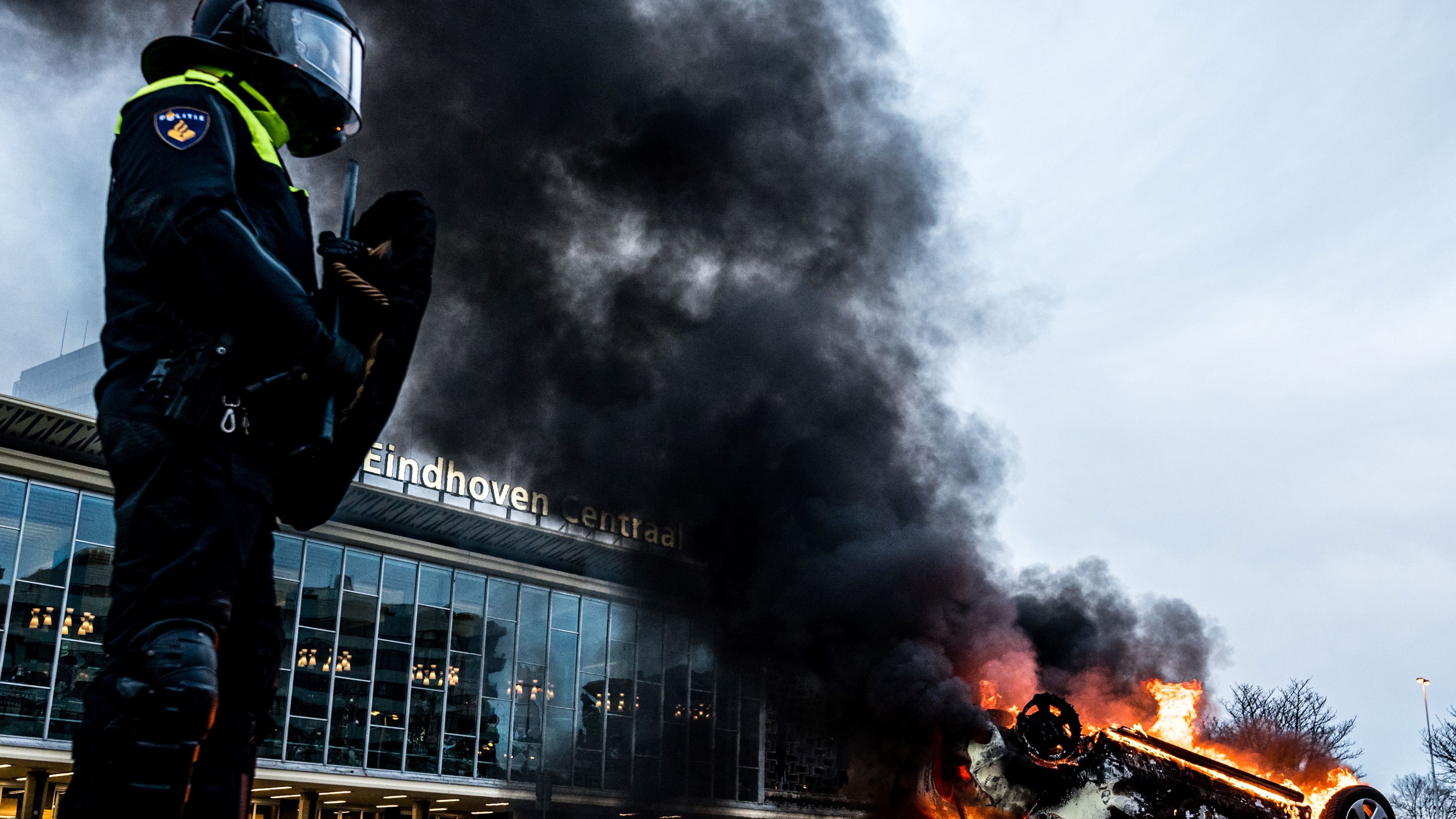How the Netherlands anti-lockdown movement turned violent
Bombing of Covid test centre near Amsterdam follows widespread protests in January

A free daily email with the biggest news stories of the day – and the best features from TheWeek.com
You are now subscribed
Your newsletter sign-up was successful
A pipe bomb explosion at a Dutch Covid testing centre has raised fears that the string of violent anti-lockdown protests and incidents in recent months is far from over.
The crude homemade device blew out windows at a drive-through test centre in the town of Bovenkarspel, 40 miles north of Amsterdam, The Sun reports. Police sealed off the area until explosives experts could examine the site before declaring it safe.
The Netherlands has seen high levels of resistance to Covid lockdown measures, with riots raging for three days across 10 cities in January during which hundreds of protesters were arrested. Three people, including a teenager, were arrested after an arson attack on a test centre in the fishing village of Urk.
The Week
Escape your echo chamber. Get the facts behind the news, plus analysis from multiple perspectives.

Sign up for The Week's Free Newsletters
From our morning news briefing to a weekly Good News Newsletter, get the best of The Week delivered directly to your inbox.
From our morning news briefing to a weekly Good News Newsletter, get the best of The Week delivered directly to your inbox.
The riots were initially viewed as a response to the introduction of a 9pm-4.30am curfew, which was the first restriction of its kind since the “stay at home” order imposed by the Nazi occupation during the Second World War, the BBC reported. However, Prime Minister Mark Rutte dismissed the explanation at the time, condemning the riots as “criminal violence”.
Organising mainly on social media apps, the rioters included “far-right extremists, hooligans, Covid-19 deniers and political protesters”, according to Euronews. Dr Jelle van Buuren, an expert in security issues and conspiracy theories at the University of Leiden, told the site: “There is a connection [between the protesters] and that is distrust in the government, hate against the government, and even more broadly, hate and distrust when it comes to all sorts of societal institutions.”
As has been seen in the UK, the country’s efforts to impose Covid restrictions have also been met with resistance from far-right figures, with Geert Wilders, the leader of the right-wing Party for Freedom, claiming the curfew was “a sign of utter impotence and panic” from the government.
The involvement of criminal gangs in the violence has also not been ruled out. The Netherlands has seen high levels of “open gang warfare” in recent years, with a “huge chunk” of Europe’s cocaine now travelling through ports in Rotterdam and Amsterdam, Vice says.
A free daily email with the biggest news stories of the day – and the best features from TheWeek.com
“And this mafia invasion, along with the subsequent violence, has sparked very real fears that the region is becoming something of a narco-state,” the site adds.
The mafia has been closely involved in stirring up protests against lockdown measures in Italy. Experts say coronavirus restrictions are “harming their business” due to “increased police checks and closures affecting their ability to demand extortion payments and leading to reduced drug sales revenues”, Politico says.
Sorcha Bradley is a writer at The Week and a regular on “The Week Unwrapped” podcast. She worked at The Week magazine for a year and a half before taking up her current role with the digital team, where she mostly covers UK current affairs and politics. Before joining The Week, Sorcha worked at slow-news start-up Tortoise Media. She has also written for Sky News, The Sunday Times, the London Evening Standard and Grazia magazine, among other publications. She has a master’s in newspaper journalism from City, University of London, where she specialised in political journalism.
-
 Crisis in Cuba: a ‘golden opportunity’ for Washington?
Crisis in Cuba: a ‘golden opportunity’ for Washington?Talking Point The Trump administration is applying the pressure, and with Latin America swinging to the right, Havana is becoming more ‘politically isolated’
-
 5 thoroughly redacted cartoons about Pam Bondi protecting predators
5 thoroughly redacted cartoons about Pam Bondi protecting predatorsCartoons Artists take on the real victim, types of protection, and more
-
 Palestine Action and the trouble with defining terrorism
Palestine Action and the trouble with defining terrorismIn the Spotlight The issues with proscribing the group ‘became apparent as soon as the police began putting it into practice’
-
 Will increasing tensions with Iran boil over into war?
Will increasing tensions with Iran boil over into war?Today’s Big Question President Donald Trump has recently been threatening the country
-
 Epstein files topple law CEO, roil UK government
Epstein files topple law CEO, roil UK governmentSpeed Read Peter Mandelson, Britain’s former ambassador to the US, is caught up in the scandal
-
 Iran and US prepare to meet after skirmishes
Iran and US prepare to meet after skirmishesSpeed Read The incident comes amid heightened tensions in the Middle East
-
 Israel retrieves final hostage’s body from Gaza
Israel retrieves final hostage’s body from GazaSpeed Read The 24-year-old police officer was killed during the initial Hamas attack
-
 China’s Xi targets top general in growing purge
China’s Xi targets top general in growing purgeSpeed Read Zhang Youxia is being investigated over ‘grave violations’ of the law
-
 Panama and Canada are negotiating over a crucial copper mine
Panama and Canada are negotiating over a crucial copper mineIn the Spotlight Panama is set to make a final decision on the mine this summer
-
 Why Greenland’s natural resources are nearly impossible to mine
Why Greenland’s natural resources are nearly impossible to mineThe Explainer The country’s natural landscape makes the task extremely difficult
-
 Iran cuts internet as protests escalate
Iran cuts internet as protests escalateSpeed Reada Government buildings across the country have been set on fire